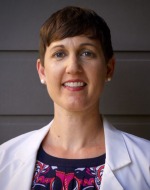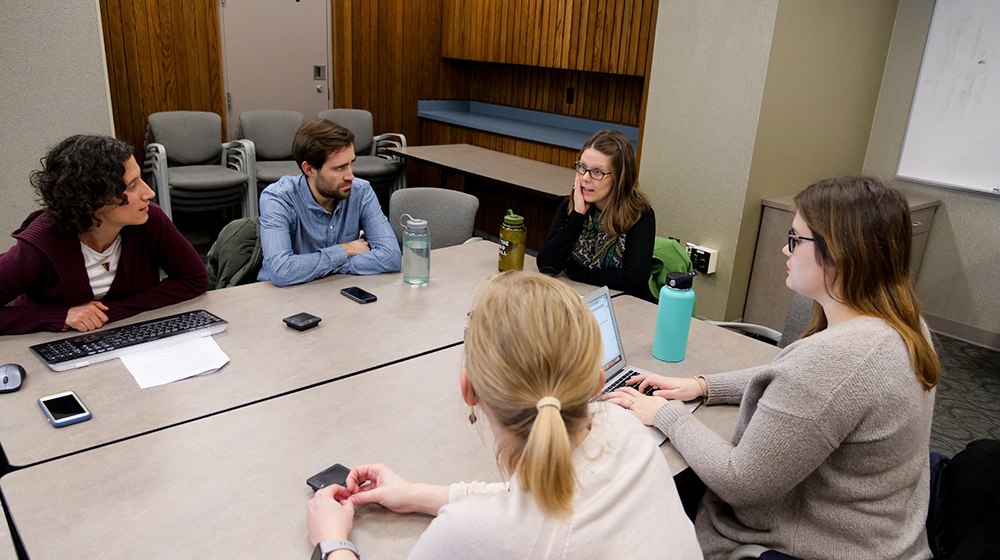Advocacy and Policy
The Department of Family Medicine and Community Health supports and encourages the essential role family medicine physicians play as advocates for their patients, community, and profession. These skills are taught longitudinally throughout the residency experience and highlighted in the following educational programs.
Courses
Community Health Course
All residents attend the Community Health course, which highlights the impacts that historical and current policies have on the social determinants of health in our communities. It emphasizes ways family medicine physicians can partner with communities to promote and enhance health. The course culminates with an afternoon of advocacy in which residents explore ways to engage in community and legislative advocacy.
Resident Advocacy Cohort (RAC)
Senior residents have the opportunity to enroll in the Resident Advocacy Cohort (RAC), which meets monthly for one year. Each session, participants learn new advocacy skills and apply them to an issue that is important to family medicine physicians and their communities. Skills taught include using social media, engaging with legislators, writing a resolution and op-ed, and participating in philanthropy.
Read more about RAC in this article.
What Alumni Say

"My participation and what I learned in the Resident Advocacy Cohort (RAC) was integral to my success in my current job right out of residency. I am the new medical director for a reproductive and sexual health startup to serve rural Minnesotans. RAC gave me the push to be more active on social media as a physician. That MD/DO has weight behind it, and it was time to use it.
With all of the important political decisions to be made during these next few months/years, my voice is integral to my patients' health, access to care, and safety. Learning to follow bills through the legislature is integral to anyone working in reproductive health due to the extreme regulations. It was a wonderful group of people with a wide variety of experience and expertise. It was awesome to be able to learn and collaborate with them. I think it should be a part of our regular curriculum in residency because advocating for our patients is part of our job." —Julie Amaon, MD

"I've been fortunate to work both on the curriculum planning committee for RAC as well as participate. Through RAC, we have been able to meet with healthcare workers, community leaders, and public officials doing important work within their communities and nationally. It has been incredibly beneficial and humbling to meet with experts in such an intimate group. We also worked on several projects that allowed us to hone our own individual and group skills, including writing letters to the editor/op-eds, contacting and meeting with legislators, forming and maintaining community partnerships, using social media to bring attention to important issues, and many other forms of advocacy work. I have appreciated the guidance of our instructors as well as other RAC participants as we practice these skills." —Rebecca Gieseker, MD

"RAC has already been instrumental in my ability to be a better advocate, both for my patients and physicians alike. From skills as simple as creating a Twitter account, and having a voice on social media, to physically going to the State Capitol to advocate for a bill, RAC has given me that confidence. I look forward to being vocal in my community of New Richmond, WI, as I move into my post-residency years. I will continue to use the skills that the group has taught to me, and I will continue to teach the next generation of advocates because of what I have learned." —Joe Renier, MD
Advocacy Resources
American Academy of Family Physicians
Stay informed on both state and federal issues. Learn how the AAFP is advancing family medicine via letters and statements on the issues facing family physicians.
Minnesota Academy of Family Physicians
On this blog, you will find legislative updates, invitations to take action on issues or proposed legislation, advocacy tools and practice resources.
MAFP Advocacy Blog MAFP Advocacy Page
Minnesota Medical Association
The MMA has brought together many different tools and resources to help you become an effective advocate.
Society of Teachers of Family Medicine
Take STFM's free Advocacy Course and learn to educate legislators on the value of family medicine, and encourage them to support expansion of a well-trained family medicine workforce.
Duke Communicator Toolkit
- Tracking the News
- Word Limits
- Structure
- Personal Voice
- How and Where to Submit
New York Times
*Note: Need a NYT subscription to read this article.
Tips for Aspiring Op-Ed Writers
University Relations
- Capitalization Rules Specific to the University of Minnesota
- Style Guides
- Additional Resources
Harvard Communications Program
- Distinguishing Characteristics of an Op-Ed or Column
- Questions to Ask Yourself When Writing an Op-Ed or Column
- Topic and Theme
- Research
- Openings
- Endings
- Voice
See Examples from Alumni:
Jan 1, 2021: "Take Care of Virus, and Your Hands," Mankato Free Press: By Lance Deeter, DO (Mankato), Rebecca Geiseker, MD (North Memorial), Elaina Hintsala-Fronden, MD (Duluth), and Thuy-Linh Nguyen, MD (Woodwinds)
Dec 21, 2020: "Doctors' View: Myths, Fears about Vaccine Can All Be Dispelled," Duluth News Tribune: By Anthony Hacker, MD (St Cloud) and Mattie Strub, MD (Methodist)
Nov 20, 2020: "Stay at Home: A COVID-19 Red Alert," St. Cloud Times: By Prakhya Bhatnagar, MD (St Cloud) and Kris Schwacha, DO (Smileys)
ACLU Tips on Writing
Letters to the editor are great advocacy tools. After you write letters to your members of Congress, sending letters to the editor can achieve other advocacy goals because they:
- Reach a large audience.
- Are often monitored by elected officials.
- Can bring up information not addressed in a news article.
- Create an impression of widespread support for or opposition to an issue.
Community Tool Box
Learn how to write and send effective print and e-mailed letters to editors of various media types, together with examples, that will gain both editorial and reader support.
- What is a letter to the editor?
- Why should you write it?
- When should you write it?
- Should you use email?
- How do you write it?
- How do you get it accepted?
Minnesota Legislature
Find out who represents you or if you know who represents you, use the House Member Information and Senate Member Information pages to see their contact information.
AAFP Speak Out
Use Speak Out to stay informed on the issues that matter most to your patients and your practice, spread the word to your colleagues, view current congressional schedules, and – most important – view your federal and state legislators and voice your opinion to them.
AAFP Advocacy Tracker
The Academy offers an array of resources to help you reach lawmakers and maximize the impact of your communication with them, whether by social media, phone or — best of all — in person.
University of Minnesota Relations
Social media can be a valuable addition to a robust communication strategy, but consider a few questions before you launch a new social media account.
Medical School Social Media Toolkit
Use this for best practices engaging on social media outlets following UMN medical school guidelines.
As physicians, our patients entrust us with their stories and experiences everyday, and we hear patterns of challenges, resources, opportunities. As a physician advocate, I get the opportunity to elevate and amplify these stories and patterns to create opportunities for changes and promote health for individual patients, in our local clinics and health systems and beyond
Dr. Katie Freeman

Members of the Resident Advocacy Cohort discuss methods to strengthen advocacy work.
